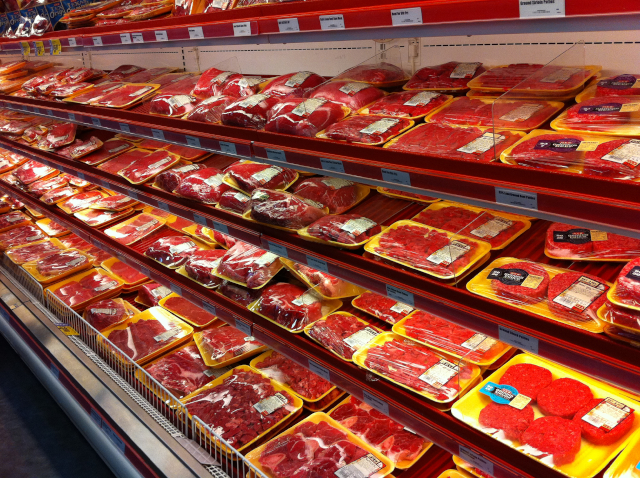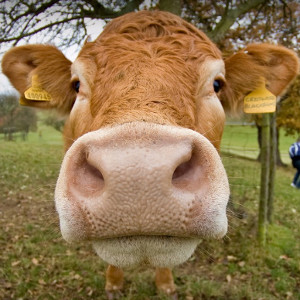A new study of dining habits among American adults has uncovered what might seem a startling fact. And researchers are imagining how our world might change if the ‘last holdouts’ among beef eaters converted to chicken or veggie proteins…
 An elaborate Beef display at a contemporary supermarket.
An elaborate Beef display at a contemporary supermarket.
Take a good look. It will be disappearing all too soon!
What they did
Researchers from Tulane University data-mined the results of the Centers for Disease Control (CDC) National Health and Nutrition Examination Survey, examining beef consumption across the population. The Survey tracked the meals of more than 10,000 adults over a 24-hour period.
The abstract of their study report points out: “The global food system emits 17 billion tons of greenhouse gases a year, equivalent to a third of all planet-warming gases produced by human activity. The beef industry contributes heavily to that, producing 8 to 10 times more emissions than chicken, and over 50 times more than beans.”
“We focused on beef because of its impact on the environment, and because it’s high in saturated fat, which is not good for your health,” said the study’s corresponding and Senior Author Prof. Diego Rose, at the Tulane University School of Public Health and Tropical Medicine.
What they found
The researchers were surprised to discover that a mere 12 percent of American adults are consuming at least half of all the beef eaten in the country on a daily basis. At least that’s what their numbers indicated.
Those folks fell into clearly defined demographics. Men of all ages, and men and women between the ages of 50 and 65.
In contrast, those below the age of 29 and above the age of 66 were least likely to eat large amounts of beef. Rose said this indicated that the younger generation might be more interested in mitigating the effects of climate change.
The takeaway
“On one hand, if it’s only 12 percent accounting for half the beef consumption, you could make some big gains if you get those 12 percent on board,” Rose said. “On the other hand, those 12 percent may be [the] most resistant to change.”
The finding may help consumer groups and government agencies craft educational messaging around the negative health and environmental impacts of beef consumption, Rose suggests.
My take
Wow! What a Swiss-Cheese theory this one appears to be!
First of all… A broader look at the greenhouse gas situation reveals that livestock contribute a relatively small part of the overall load. Currently, in fact, around 11 percent of the total. Fossil-fuelled vehicles, massive wildfires all over the globe, and heavy industry contribute the lion’s share of pollutants.
I have to wonder how valid a study that focused on adults alone can be. Kids – particularly teens – have hung out at McDonald’s and other Fast Food joints for generations. Some buy their lunch there 5 days a week. And the majority of those lunches consist of a burger, fries and a sugary drink. How do the kids and teens figure into the broader beef consumption picture?
The numbers used in the survey apparently come from self-reported consumption studies. Not from overall supermarket and restaurant sales figures. The latter would constitute much harder evidence to back whatever conclusions the study researchers might come to.
I also think that the study report vastly underestimates the power of the phenomenon behind Rose’s casual observation that, “[T]hose 12 percent may be [the] most resistant to change.” The old folks will never change. Old folks just become more and more entrenched in their preferences and routines as time goes on.
The younger generations, Rose notes, might be more interested in mitigating the effects of climate change. I don’t think that’s the case at all. The under 30s are massively choosing healthier, lighter and ‘more interesting’ foods, and – as a result – leaning more dramatically to nutrition regimes such as the Mediterranean Diet and vegetarianism.
So let’s not get too worked up about the Tulane study’s findings and what they may portend. Especially you beef producers out there. On the other hand, you guys (and gals) should already be gearing up to switch from producing red meat to growing soy beans as the Sustainability Crisis looms every nearer…
~ Maggie J.

